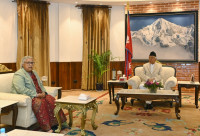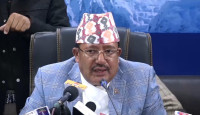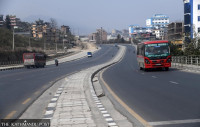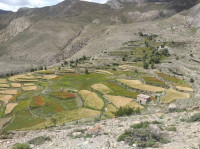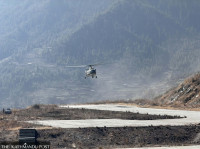National
This fiscal year, Nepalis are already dying in foreign lands at a rate of two every day
In the last two months, 124 Nepali workers have died in foreign labour destinations, primarily Malaysia and the Gulf countries..jpg&w=900&height=601)
Chandan Kumar Mandal
The current fiscal years has only just started and Nepalis are already dying at an inordinate rate in foreign lands.
At least 124 Nepali workers—an average of two every day—have died in various labour destination countries in the first two months of the current fiscal year.
According to statistics from the Foreign Employment Promotion Board, 120 men and four women migrant workers died in the past 63 days in labour destinations. Many of these deaths have been attributed to unsafe and strenuous working conditions.
“It is tragic. The major causes of deaths of Nepalis abroad are workplace conditions, road accidents and diseases,” said Din Bandhu Subedi, spokesperson for the board. “The number of deaths is higher in Malaysia and the Gulf countries where the number of Nepali workers is also high.”
The continuing deaths show that the government and labour destinations’ pledges to improve working conditions and uphold basic rights have been limited to paper.
A total of 6,708 Nepalis who had gone abroad for employment returned home in coffins in the last decade. These deaths, recorded between 2008 and 2018, took place across 34 labour destinations. Fatalities of Nepali workers and others returning home permanently disabled or diagnosed with critical illnesses have continued unabated.
Last fiscal year, a total of 753 Nepali workers died and the year before that, 821 Nepalis died in as many as 19 countries. The majority of deaths were reported in Malaysia, Saudi Arabia and Qatar.
According to Barun Ghimire, a human rights lawyer and programme manager at the Law and Policy Forum for Social Justice, an organisation that works on migrant rights issues, government agencies are treating Nepali migrant deaths as statistics.
“Deaths of migrant workers in labour destinations have become so frequent that they don’t bother government agencies anymore,” said Ghimire. “Migrant deaths are being treated like road fatalities.”
A recent investigation by The Guardian showed that heat stress continues to kill migrant workers in Qatar, where thousands of Nepali workers are building stadiums for the 2022 World Cup.
According to government figures, 1,426 Nepali workers died between 2009 and 2019 in Qatar. Numerous reports have revealed that Nepalis working on World Cup construction projects are still facing exploitation, six years after an initial Guardian expose revealed the dismal state of workers in Qatar.
“Continuing deaths show that we have failed our workers and their families back home,” said Ghimire. “We are talking about safer migration but our labour migration governance has remained utterly ill-managed.”
According to Ghimire, the government needs to be proactive in utilising the billions of rupees available in the Migrant Workers Welfare Fund, which the board manages, rather than using the fund for compensation after deaths and injuries have occurred.
“Millions of rupees are often collected by the public to pay blood money to save migrant workers in foreign lands. But when it comes to saving the person in trouble using the welfare fund, there is no provision for that. It seems the money is spent on compensating dead workers whereas those alive continue to struggle,” said Ghimire.
The board has been providing financial support to migrant workers and their families in case of their death and serious injury, and for treatment for life-threatening illnesses.
Among its numerous mandates, the board, which functions under the Ministry of Labour, Employment and Social Security, is expected to protect and promote the welfare of workers abroad. However, not much has changed for Nepali workers in foreign countries, where they continue to live and work under harsh conditions facing financial, physical and sexual exploitation.
Subedi, the board official, said that the existing module of pre-departure orientation training, which is mandatory for aspiring migrant workers, is being upgraded in its content and duration from two to three days in a bid to provide comprehensive information about labour migration and destination countries.
“We are also focusing on providing skills to our workers. Once they are skilled, they can either work here or go abroad,” said Subedi.
***
What do you think?
Dear reader, we’d like to hear from you. We regularly publish letters to the editor on contemporary issues or direct responses to something the Post has recently published. Please send your letters to [email protected] with "Letter to the Editor" in the subject line. Please include your name, location, and a contact address so one of our editors can reach out to you.




 13.42°C Kathmandu
13.42°C Kathmandu
